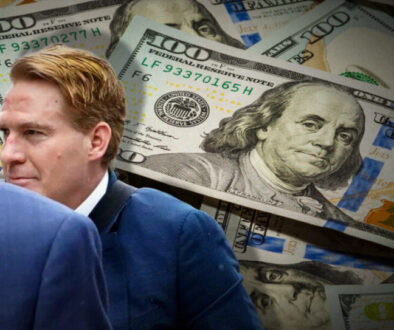Greg Lindberg loses appeal and could lose much more
Troubled financier Greg Lindberg lost again in court Tuesday, and the result could be very costly.
A North Carolina Court of Appeals decision upheld a May 2022 Wake County Superior Court ruling against Lindberg and several associated companies. The civil case filed by four insurance companies once owned by Lindberg accused him of engineering a fraud and sought monetary damages.
A lower-court ruling found Lindberg guilty of fraud, but did not award monetary damages. Lindberg appealed the fraud verdict, while the insurers filed a cross-appeal on the denial of damages.
The three-judge appeals panel ruled for the four insurers on every point. Lindberg’s legal team argued that plaintiffs are not entitled to compensatory or punitive damages for fraud, claiming that it would amount to “double recovery,” running afoul of North Carolina’s “election of remedies” doctrine.
Lindberg is fighting criminal and civil charges on several fronts in a complex web of alleged financial and criminal wrongdoing. He served one year in prison before a federal court of appeals tossed out his bribery conviction due to faulty jury instructions.
A spokeswoman for Lindberg did not provide a comment as of midday Wednesday.
‘Separate and distinct wrongdoing’
In her opinion, North Carolina Judge Julee Flood rejected Lindberg’s claim of “double recovery.”
“Our Supreme Court’s precedent demonstrates that remedies for both breach of contract and fraud may coexist,” Flood wrote. “Here, the doctrine of election of remedies does not bar Plaintiffs from recovering for both specific performance and for monetary damages because each remedy relates to a separate and distinct wrongdoing by Defendants.”
The lawsuit will return to the lower court to address the damages to the plaintiffs.
Lindberg, founder of the private equity firm Eli Global, eventually acquired several insurers and grouped them together as the Global Bankers Insurance Group. Insurance profits soared and ultimately enabled Lindberg to funnel $2 billion to Eli Global, according to a Wall Street Journal report. That attracted regulators and initiated Lindberg’s downfall.
Lindberg made a special agreement with former Insurance Commissioner Wayne Goodwin allowing him to invest up to 40% of his insurance companies’ assets into affiliated business entities.
“Lindberg then invested up to forty percent of Plaintiffs’ money into the purchase of other, non-insurance companies, also owned by Lindberg,” Flood noted. “Simply put, Lindberg created a scheme in which he caused $1.2 billon held for Plaintiffs’ policyholders to be invested into other non-insurance companies that he also owned or controlled.”
In November 2016, Goodwin lost his seat to Mike Causey, who reduced the cap on affiliated investments from 40% to 10%.
“Lindberg struggled to untangle his affiliated investments and, as the deadline for diversification drew near, the North Carolina Department of Insurance … grew concerned that there would be a ‘mismatch between investments and policyholder liabilities,’” Flood wrote.
“In other words, because Lindberg had invested so much of Plaintiffs’ money into affiliated companies, the NCDOI worried that Plaintiffs might experience a shortfall on their obligation to pay individual policyholders,” Flood added.
More trials upcoming
Lindberg had been sentenced to more than seven years after being convicted of attempting to bribe Causey to secure preferential regulatory treatment. The 4th Circuit panel declared that Judge Max Cogburn had erred by giving jurors in Lindberg’s trial misleading instructions before they began deliberations.
In March, Cogburn agreed to move Lindberg’s retrial to November.
Finally, Lindberg was indicted in February on federal fraud charges. The 48-page indictment handed down by a federal grand jury in Charlotte accuses Lindberg and two co-conspirators of illegally siphoning vast amounts of money from Lindberg’s insurance companies for his personal use, then lying to regulators to hide their $2 billion scheme.
Lindberg is specifically charged with one count each of conspiracy to defraud the United States, money laundering conspiracy, and wire fraud; four counts of making false insurance business statements to regulators; and six counts of making false entries about the financial conditions or solvency of an insurance business.
The case was investigated by the Charlotte office of the FBI.
The money laundering and wire fraud charges alone carry maximum punishments of 20 years in prison; the conspiracy to defraud the government count, 10 years.
Last week, Cogburn ordered a delay in the trial on the new fraud charges. The new schedule calls for a status conference in the case to take place in “the trial term commencing three months after the conclusion” of Lindberg’s bribery retrial.
InsuranceNewsNet Senior Editor John Hilton covered business and other beats in more than 20 years of daily journalism. John may be reached at john.hilton@innfeedback.com. Follow him on Twitter @INNJohnH.
© Entire contents copyright 2023 by InsuranceNewsNet.com Inc. All rights reserved. No part of this article may be reprinted without the expressed written consent from InsuranceNewsNet.com.
The post Greg Lindberg loses appeal and could lose much more appeared first on Insurance News | InsuranceNewsNet.



